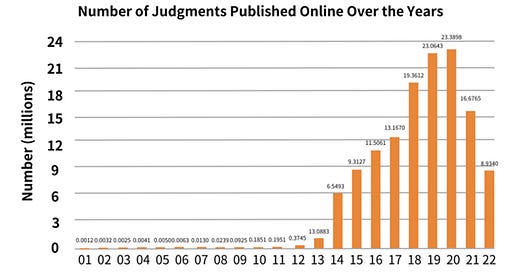The end of China Judgments Online?
Maybe we are panicking too soon, but it sure looks like a giant step backwards for transparency.
Source: Zichen Wang, Peiyu Li, and Yuxuan Jia, “Tsinghua Law Professors Call for Renewing Open Access to China’s Court Judgments,” Pekingnology, December 12, 2023 (link below)
The Chinese legal world has been thrown into some commotion by the recent appearance of a document (see below for links) from the Supreme People’s Court announcing the creation of the National Court Adjudication Documents Database (全国法院裁判文书库) (NCADD), to which all judgments except for those involving secrets and sensitive matters are to be uploaded. You would be forgiven for thinking, “Wait a minute—isn’t there already a national judgments database?” Indeed there is: the China Adjudication Documents Network (中国裁判文书网) (known in English as China Judgments Online or CJO).
CJO exists online and is publicly available. The NCADD, by contrast, will be for internal use only within the court system (and possibly other institutions within the political-legal system). Since both are supposed to carry all judgments, with minor exceptions, what is the point of creating a new database? A lot of people are concerned that this may herald the disappearance of CJO. The official announcements about the NCADD have not addressed this concern, staying silent about the future of CJO.
The concern is not misplaced. In recent years, fewer and fewer cases have been appearing on CJO, and many cases have been removed. It seems that the state is having second thoughts about the judicial transparency it was trumpeting just a few years ago.
This downgrading of CJO has not gone unnoticed in China or abroad. By the sheerest coincidence, the Columbia Law Review has just posted on its website a new article precisely on this subject: Benjamin Liebman et al., “Rolling Back Transparency in China’s Courts,” Columbia Law Review 123, no. 8 (2023): 2407–81, https://columbialawreview.org/content/rolling-back-transparency-in-chinas-courts/.
Here are some more resources on this issue:
Commentary: Zichen Wang, Peiyu Li, and Yuxuan Jia, “Tsinghua Law Professors Call for Renewing Open Access to China’s Court Judgments,” Pekingnology, December 12, 2023,
[https://perma.cc/6VHL-D8P4]. This piece sets forth useful background information and contains translations of the dismayed reactions of law professors in China, including a very long piece by He Haibo, a professor of administrative law highly respected in China and abroad.
Text: 法客帝国, “风向标?最高法院:立即上线裁判文书库,专供法官查询检索(法办〔2023〕551号),” 网易, December 11, 2023, https://www.163.com/dy/article/ILM6P8B40521BAA5.html [https://perma.cc/T7GZ-CBAM]. This item contains what purports to be the text of the Supreme People’s Court document, issued on Nov. 21, 2023, that everyone is talking about. It also contains what purport to be images of each page of the original document. (I have put together a PDF file that contains the imaged text; it’s available here.) Why do I keep saying “purport”? It’s because the digital text and the imaged text have at least one discrepancy that I noticed. There is some problem in the break between pages 2 and 3 in the graphic. The words “新增”, for example, don’t appear in the digital version.





